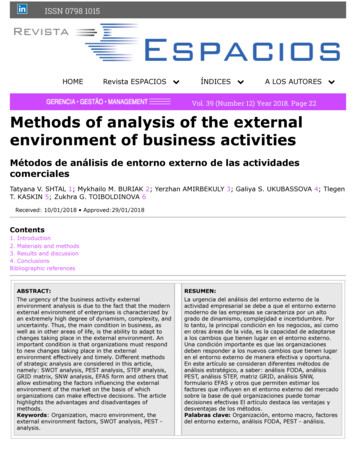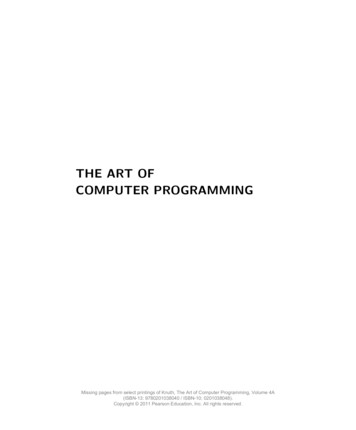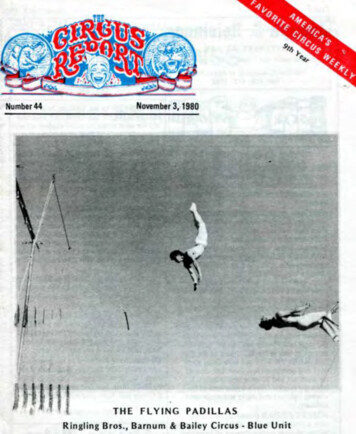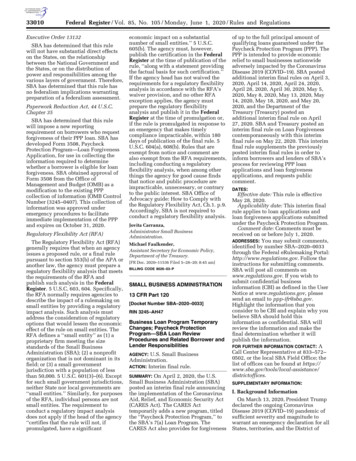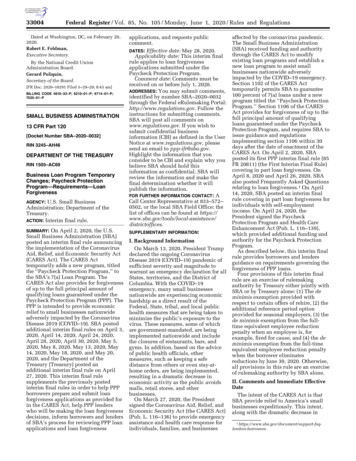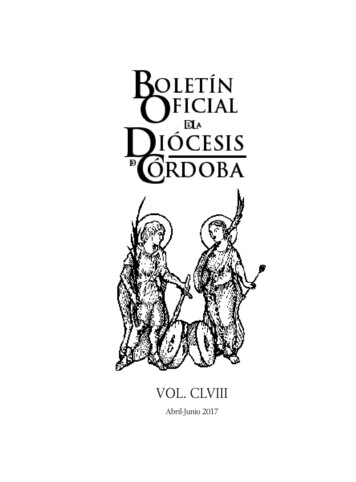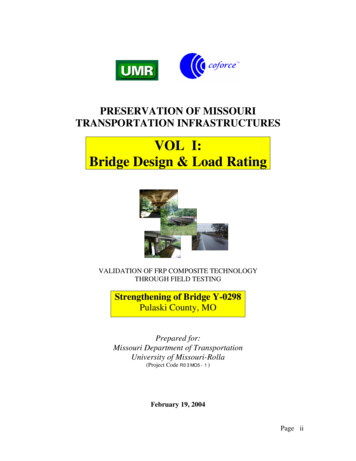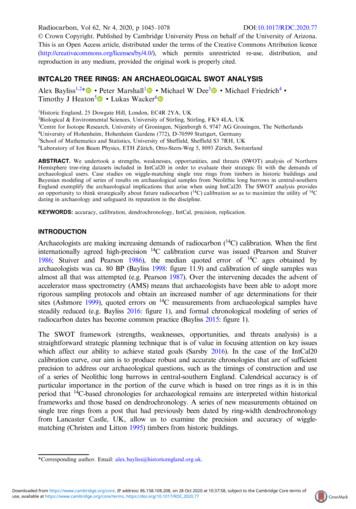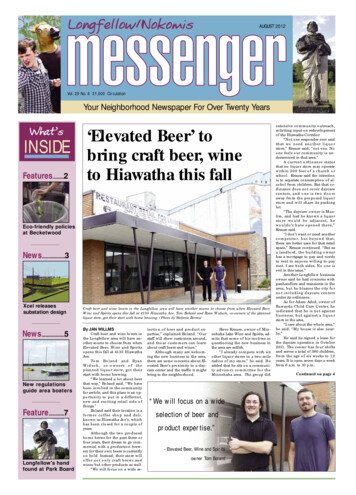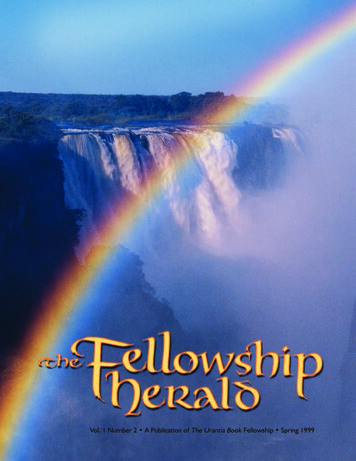
Transcription
Vol. 1 Number 2 A Publication of The Urantia Book Fellowship Spring 1999
IC 99Photos Douglas LeightonAugust 7 - 12, 1999Vancouver, CanadaDear Friends,There is still time for you to register for SpiritQuest 2000,the Fellowship’s 1999 International Conference. This 6 day event(August 7 - 12, 1999) features a wide range of activities for allreaders of The Urantia Book and their families. Over 70 differentpresentations and discussion groups are planned, covering the fulland diverse range of Urantia Book interests. A separate, fullfeatured and professionally staffed program has been designed forall children, from toddlers through teens. Plus, each day will offerdiverse group worship opportunities and a wide variety of entertainment and recreation options. Most important, SpiritQuest2000 will provide you with an opportunity for fellowship with over1000 Urantia Book students from all over the world.We sincerely hope you will be able to join with us for thisgreat Urantian celebration at the beautiful campus of the University of British Columbia in Vancouver, Canada. If so, please tearout, complete, and return the conference registration form (thelast two pages of The Fellowship Herald) as soon as possible.We look forward to seeing you this summer!In Fellowship,Steve DreierIC99 Conference Chair
CONTENTSVOL.1 NUMBER 22Editor’s Comment2The Challenge of the 21st CenturyMeredith Sprunger4On Facing Millennial ChangeByron Belitsos6Magisterial MissionsBehzad Sarmast10 Springtime: A Study of the FutureHenry BegemannSPRING 199915 Whither Goest Thou, Woman?Jeanne Melchior17 The Seven Psychic CirclesLinda Buselli19 On Removing The Barrier To ACivilized Discussion Of EugenicsStephen22 The Basket - A PoemCharlene MorrowContents Page ArtPublications Committee Members: Avi Dogim, Chairman, Linda Buselli, Gary Deinstadt,Nancy Johnson, Carolyn Kendall, Sage Waitts Editor: Linda Buselli, Spring Edition Design & Layout: Sage Waitts Masthead Design: Courtesy of Nick Curto Published biannually by Uversa Press, a subsidiary of The Urantia Book Fellowship, 529 WrightwoodAvenue, Chicago, IL 60614-1794 Phone: 773/327-0424 FAX: 773/327-6159 E-Mail:fellowship@urantiabook.org Quotations are from The Urantia Book unless otherwise noted.Changing WomanVincent Ventola 1948 - 1991.A long time believer in TheUrantia Book, an artist, writerand loving husband and father.Spring 1999 The Fellowship Herald 1
THE CHALLENGEOF THE21ST C ENTURYMeredith J. Sprunger - Ft. Wayne, IN(The following presentation was given at the MidwestRegional Conference held at Fall Creek, Illinois StatePark, October 7 & 8, 1995.)tential for altering living organisms. Recombinant DNAtechnology makes it possible to restructure both plantsand animals and produce a variety of drugs, industriallubricants, and enzymes. Human applications will rangee are living in one of the major turning points from predicting inherited genetic diseases to applying geneof history. Our times have been labeled vari- therapy for correcting genetic disorders. The new physously as the post-industrial, post-modern, and ics is radically changing our conception of the nature ofpost-Christian era. The traditional paradigms of cosmol- material reality. We are, literally, being ushered into a newogy, value, and reality have lost their unquestioned rel- world of potential development.Among the many problems that we face, the mateevance and authority among contemporary people. Thesocial institutions which were structured by these tradi- rial-environmental, economic, and political difficulties aretional concepts and values are deteriorating in vitality much easier to cope with than the personal-spiritual andand influence. The economic and political infrastructures social-cultural problems. Our industrial-technologicalof society are breaking down and losing their credibility civilization has broken up the small communities whichand effectiveness. The mores that have been the founda- were indigenous to the agricultural society and isolatedtion of human behavior and ethical standards in society the individual in specialization and urbanization. Theare crumbling, and immorality, crime, and violence are advent of the computer has accelerated this separationendemic. Religious institutions that were once the cen- and seclusion. The sense of community and the extendedtral pillars of society are now relegated to a peripheral family are greatly diminished. Even the segregated industrial-business groups and the nuclear family exist in relaposition.As we face the twenty-first century, there are nu- tive cultural isolation. This detachment and isolationmerous scientific-technical innovations which will revo- contributes to the deterioration of family and commulutionize the way we live. Computers and computer nity influence. The inherent human hunger for commutechnology are changing the way we handle information nity and belonging causes young people to join gangs withand communication. Microbiology is opening a vast po- territorial-defensive agendas and motivates adults to affiliate with ideological andreligious groups with exclusiverestrictive boundaries.Dear Readers:At the root of the breakWelcome to the second issue of The Fellowship Herald. Thanks todown of individual behavior, theall of you who have sent us your letters of encouragement in response todeterioration and malaise of ourthe first. This semi annual publication of The Urantia Book Fellowship issocial institutions, and the faildesigned to bring you articles and other material that the editors conure of our religious institutionssider to be of interest to readers of The Urantia Book. In keeping withto satisfy our spiritual hunger andour intent to have a wide diversity of viewpoints represented in this pubinspire our creativity is that ourlication, we would like to remind you that your comments would be mostcivilization is trying to draw rewelcome. Letters to the editor may be published in future editions. Whilesources and energy from a horsewe may not be able to publish all of the letters we receive, we would likeand buggy paradigm of realityto publish some, especially those that are likely to be thought provoking.which has lost its relevance andWe are also interested in including artwork in future issues. Whileserviceability. There are diversewe have no specific ideas in that regard, we will be looking for work ofand confused views of reality inhigh quality which is consistent with the “spirit” of the publication. Arttoday’s world. Many scientificallywork will be printed in black and white so please keep this in mind whenoriented people have a materialyou send it in.istic-positivistic understanding ofWhether or not any submission is published shall be at the discrelife. Most religionists have a simtion of the editors and subject to space considerations.plistic view of spiritual cosmolThe Editorsogy that does not harmonize withW2 The Fellowship Herald Spring 1999
our astronomical view of the cosmos. And a great portion of society are confused about what to believe. Thebasic dilemma of our times is that we have no unifyingconception of reality.The singular ingredient which will bring meaningand unity into planetary existence is an inspiring paradigm of reality which will harmonize science, philosophy,and religion and inspire humankind to strive for common goals and objectives. Only a new and enlarged revelatory vision of reality has the potential of doing this.Hopefully, the searchers of our world will discover theFifth Epochal Revelation in the twenty-first century. TheUrantia Book is the only source of reality that is largeenough and spiritually empowering enough to unify andenergize the entire planet. Enculturating the world withthe inspiring and ennobling teachings of the Fifth Epochal Revelation is the challenge of the twenty-first century!T HE H EART OF THE PROBLEMEARTWhere does one start in healing our ailing society?At the heart of the many problems of contemporary society is the failure of the individual to experience a meaningful relationship with spiritual reality that initiates andsustains a dedication to truth, beauty, and goodness. Theindividual fails to experience this relationship because thesource of our introduction to spiritual reality in contemporary culture lacks credibility. It is not an integral partof our educational exposure to the complex modern worldin which we live.Two basic changes need to occur in the twenty-firstcentury to overcome this educational deficiency. First,our culture needs to discover the Fifth Epochal Revelation, which will give us the expanded picture of spiritualreality that harmonizes with our scientific-technologicalsociety and unifies science, philosophy, and religion. Secondly, our entire educational system needs to be redesigned. Philosophy and spiritual values need to beintegrated into the humanities educational curriculumand taught from kindergarten through college. Of almostequal importance, the educational curriculum must berestructured to involve pupils in “real life.” Just as education in the agriculture society required working in farming activities, so must we involve pupils in the real worldvery early in their educational experience. Educationshould not be a preliminary exercise to real life, but acontinuing activity throughout life.The teachings of The Urantia Book are tailor-madefor the problems of the twenty-first century. Not only doesit present a paradigm of reality that unifies science, philosophy, and religion, but it emphasizes the importanceof family and community life. Its picture of planetary lifeas the foundation of an ongoing career of personality andspiritual growth provides strong motivation for contemporary growth and achievement and an inspiring visionof the endless adventure of eternity. Young people arechallenged to actualize their potentialities and those whoare disillusioned in middleage are assured that personality and spiritual development is more important thanworldly success. The elderly are encouraged to continuegrowing and given a vision of the potentials of a renewedbody and an improved mind at the next level of existence. Those who find themselves isolated and lonely learnthat they are never alone. The indwelling presence oftheir Thought Adjuster and guardian angels provides asense of community. The extensive wisdom shared concerning economic, political, and religious institutions willserve as an antidote for the ills of our troubled society.Finally, the life and teachings of Jesus will inspire all peopleto seek fulfillment in the religion of Jesus: the Fatherhood of God and the brotherhood of man.THE A SCENDANCY OF THE F IFTH E POCHAL REVELATIONSCENDANCYEVELATIONDuring the first forty years of its history, the Urantia movement has evolved from a handful of readers inChicago to hundreds of study groups and tens of thousands of readers throughout the world. Without masspublicity or promotion, over 400,000 copies of The Urantia Book have been sold and translations are available inFrench, Spanish, Finnish, Russian and Dutch. A vastamount of information about the Urantia Papers is available on the Internet. Audio and computer versions ofthe book are available and numerous study aids have beenpublished. Regional and International Conferences arebeing held, and secondary works are proliferating.All this is impressive but of much greater importance is the tempering and structuring of the Urantiamovement in preparation for its world-wide mission. Therugged struggle of these early years has established solidfoundations for carrying a new paradigm of spiritual reality to humankind. The Urantia movement very early inits history has encountered most of the challenges thathave threatened religious transitions down through history. We have received an experiential vaccination againstthese viruses which have threatened creative spiritualgrowth in the past. The Fifth Epochal Revelation hasdemonstrated its dynamic and power in steering the movement repeatedly through critical periods and controversial encounters in our journey.The Urantia movement has been confronted bycentralized organizational control and we have witnessedthe power of individual initiative and creative diversityto establish a pluralistic foundation for outreach minis-Spring 1999 The Fellowship Herald 3
try. We have escaped oligarchical-authoritarian directionin the triumph of participatory democracy and openness.We weathered the threat of legalistic-power strategiesthrough the dominance of cooperative team work.Soon after regional and national conferences wereheld, students of The Urantia Book were captivated andchallenged by the intrigues of charismatic control of theUrantia movement. With the passing of time, we recognized the danger of charismatic influence and witnessedthe emergence of evolutionary-rational decision-making.On the heels of this tempering experience, we were confronted by a more subtle form of charismatic influence inthe captivating channeling movement among readers ofThe Urantia Book. Following the example of the Christian church in dealing with similar movements in its history, we have achieved the spiritual maturity to allowindividual freedom to evaluate the authenticity of spiritual experience.We are now entering the intellectual-spiritualstruggle which took mainline Christianity centuries tolargely resolve: distinguishing between the contemporary,fallible human carrier concepts used in revelation fromits eternal spiritual truths. Martin Gardner’s book, Urantia: The Great Cult Mystery, may help to shorten this period in the Urantia movement. It may also help to guardagainst cult attitudes among those who have living faithin the enlarged spiritual truths of the Fifth Epochal Revelation.The solid core of the Urantia movement has comethrough these tribulations with renewed dedication andbalance. We have come of age. Spiritual freedom and participatory democracy have taught us that there can beunity of purpose in the midst of intellectual and politicaldiversity. The Fifth Epochal Revelation will make its wayand overcome any barriers placed in its way. We are standing at the threshold of “one of the most amazing and enthralling epochs of social readjustment, moral quickening,and spiritual enlightenment” on our planet. The preliminary, orienting growth developments of the Urantia movement are largely behind us. The Most Highs have preparedus and our planet for the most thrilling vision of spiritualreality since Jesus of Nazareth walked on our world. Thisoutreach mission will be many-faceted, pluralistic, andvictorious!Meredith Justin Sprunger is a minister in the UnitedChurch of Christ and a college professor, now retired frompastoral and teaching responsibilities. For many years he wasactive as a counselor and psychological consultant, holding aPrivate Practice Certificate in Psychology in the State of Indiana. He has served congregations in the Midwest and taughtat Elmhurst College and Indiana Institute of Technology, functioning as head of the Department of Psychology, chairman ofthe Division of Liberal Arts, and President.Meredith has served as a Field Representative, chairman of the Education and Fraternal Relations Committees,and President of Urantia Brotherhood. He is founder andExecutive Director of The Christian Fellowship of Studentsof The Urantia Book, a trustee of the Jesusonian Foundation, and editor of The Spiritual Fellowship Journal.ON FACING MILLENNIAL CHANGEByron Belitsos, Navato, CAWith the end of the millennium upon us andtheY2K crisis imminent, the word “apocalypse”is going to be essential in everyone’s lexicon,especially the media. Originally – biblically – the termapocalypse meant a revealing of secrets, an “unveiling”of hidden truths. “Apocalyptical millennialism” – an impossible phrase for the media to pronounce glibly (andthus much less overused) – refers to the unveiling of thehidden secrets of times, at the end of historical time –more specifically at a millenium’s end. In the end-times,as the apocalyptical millennialist tale goes, evil and suffering – all the things and people one finds insufferable –will finally come to a decisive end in a new and undreamed-of Utopia.4 The Fellowship Herald Spring 1999Throughout the 90’s, apocalyptical millennialismhas become increasingly pervasive – and not just in fundamentalist circles. If you look across the spectrum oftoday’s millennialist prophecies – from the rising Y2Kparanoia to the Heaven’s Gate UFO cult – there seem tobe two poles of apocalypticism. At one extreme is what Iwould call “New Age” millennialism, offering the individual a radical overcoming of the human condition – anapocalypse of the self. The other extreme is best represented by fundamentalist Christian millennialism, whichpreaches a fiery apocalypse of history. Both mark a decisive break from the more balanced visions of the future,such as that found in The Urantia Book – those forecastinga gradual lessening of evil (personal or historic) through evo-
lutionary change that is grounded in cosmic law.The sane approach to the coming millennial changesshould exclude the shortcut fantasies of transformationdreamed up by the apocalyptical imagination of Christians, New Agers, or anyone else. Instead, we need toremain mindful of all forms of fluctuation in the tempo ofchange, while resting in the stillness of the eternal spiritwithin us. This means reckoning ourselves with the entire sweep of evolutionary change, including naturallyoccurring periods of epochal transformation that mightresult from a global financial breakdown, or the consequences of the Y2K crisis. Squaring ourselves with genuine change does not mean embracing some magicalapocalypse of time that removes the need for arduousinner spiritual work or involvement in the democraticpolitical process.C OMMON T HREAD I N M ILLENIALISMHow best to recognize a toxic version ofapocalyptical millennialism? Despite all their diversity, theend-time prophecies of the late 1990’s do seem to sharecertain key qualities. First of all, most of them are sourced– often unwittingly – from the Bible itself, the commoncultural template for apocalyptical fantasies in the West.Second and most important, they all manifest an all-toohuman desire to put a sudden end to the misery of history, to make way for the new Utopia of the“beyond-times.”Well, then, what exactly is time? The cosmologistStephen Hawking published an almost unreadable bookon the nature of time that became an internationalbestseller. Feels good to know that there’s a tidy “briefhistory of time” out there that someone, somewhere, hasa handle on – right? But the truth is that we each haveto consciously confront the problem of time: in fact, asThe Urantia Book makes clear, we can’t even think logically without referring to some framework that describesthe origin, history, and destiny of all things. Scholars likeMircea Eliade point out that every culture generates itsgoverning myths within a framework that logically explains beginnings and endings. The archetypal pattern ofmythic consciousness, he shows, always includes at leastthree elements: a creation myth (origin); a fall from graceinto the suffering of time (history); and a vision of thelast things, or end-times (destiny).Christianity is certainly no exception here. Genesisprovides a distinctive creation myth. This is followed bya fall from grace by Adam and Eve, and their expulsionfrom the Garden that marks the beginning of the miseryof human history (See Genesis 3:18: “Cursed is the groundbecause of you, in toil shall you eat of it all the days ofyour life ”) As for the notion of destiny, the propheticDespite all their diversity, theend-time prophecies of the late1990's do seem to share certainkey qualities.passages in Daniel, Ezekiel, the New Testament, and theBook of Revelation have been the scriptural well fromwhich end-timers have drawn their magical visions of theend. In addition, most millennialist scenarios are alsosourced from one-sided selections from the many phasesof Jesus’ own teaching about the coming Kingdom of God.That’s perhaps one reason why we find the midwayerstaking great pains to present the multifaceted nature ofJesus’ gospel in Paper 170.Though it is more difficult to trace the universal,cross-cultural human urge that underlies apocalypticalmillennialism, there are many clues. Again, one of itsclearest marks is an immature impatience with time itself– with the inexorable slowness of evolution. End-timesprophets simply cannot accept the pacing of the overcoming of evil in history.P RESUMPTION V ERSUS H OPESo what about the problem of evil? What kind ofGod is it, after all, who permits such unmitigated evils aswar, famine, genocide and oppression? Must we enduresuch miseries forever? I believe the answer seems to comedown to two stark alternatives: the presumptuous fantasies of end-time prophets, versus a balanced hopefulnessthat grows from some sort of religious faith or spiritualforbearance – true patience.In Old Testament prophecy (see, for example, theBook of Joel), God is an omnipotent and just God whopromises his people a “Day” of the end to evil and suffering. This hoped-for fulfillment of God’s promise is thebasis of what theologians call hope eschatology. In hopeeschatology, we live in the light of trust in the divine promise; in other words, our hope flowers forth in the serenityof a patient belief in an inevitably better future.But such hopefulness is a narrow path. Hope alwaysdepends on a most difficult existential exercise – enduring faith. In his book, Theology of Hope, the great theologian Jurgen Moltmann identifies the forms of impairmentof hope as despair and presumption:“Presumption is a premature, self-willed anticipation of the fulfillment of what we hope for from God.Despair is the premature, arbitrary anticipation of the nonfulfillment of what we hope for from God. Both forms ofSpring 1999 The Fellowship Herald 5
hopelessness, by anticipating the fulfillment or by givingup hope, cancel the wayfaring character of hope. Theyrebel against the patience in which hope trusts in theGod of the promise.”Presumption and despair are “sins against hope,”says Moltmann. And presumption is the impairment ofhope deployed by apocalypticism. In essence, apocalypticalmillennialism imposes a narrow, wishful, circumscribed,human timetable upon God’s cosmic promise of orderlyevolutionary change that is based, if you will, on the absolute justice of karmic law. Apocalypticism strikes againstour hope in lawful, cosmic evolution – with petty presumptuousness that thinks it knows just what the futureholds for you and me.Psychologically, apocalypticism chafes at the presence of evil, losing all sense of proportion. It is overlyintolerant of imperfection. At some point it abandons theway of hopefulness in any divine promise. And in theend will manufacture some end-time scenario that’s customized to the needs of the moment. Currently, we areseeing this malady occur in the case of the Y2K crisis. Itis true that Y2K is a national emergency of sorts; but watchthe press over the coming months, and I predict that youwill increasingly witness that this genuine crisis becomesframed in a presumptuous apocalypticism. Fearful visionswill be spouted forth in the websites and broadsides ofapocalyptical millennialists of every stripe.As you do study this phenomenon, bear in mindthroughout that apocalyptical millennialism is prideful aswell as presumptuous. For example, philosopher KennethBurke shows that end-times predictions presume a knowledge of the very essence of human history. To proclaim “ahistory’s end,” says Kenneth Burke, “is a formal way ofproclaiming its essence or nature ”But through presuming that it knows the very secret of time, apocalypticism shortcuts the challenges oftrue faith and of spiritual practice. To restate: Sane spirituality rests on patient hope in the promises of the Fatherthat we will all, in time and through our ascension toward Paradise, consummate our deepest spiritual aspirations. This hope beckons us forward in serenity. It mayeven allow us to discover God’s own faithfulness to unfathomable cosmic law. And finally, we find that the wayof hope is also bathed in mystery – in not knowing howit’s all going to turn out, and when. It celebrates the greatmysteries of time, of God, and of love.Thus we find that faith (spiritual practice) and hopeare interdependent; we find that together, they inducesoul growth. Character is built through continually facing the challenge of the unknown with a practice that isenergized with hope. When hope in the future becomesa presumptuous knowledge of the very secrets of time,our spiritual practice is derailed. This is the danger ofapocalyptical thinking to personal growth and to orderlyprogress of the human community.Byron Belitsos has been reading The Urantia Book for25 years. He is publisher of the new book, Just in Case: Dispatches from the Front Lines of the Y2K Crisis, (OriginPress, May 1999), a widely acclaimed anthology of key essays on the Year 2000 computer crisis. He is also publisherand co-editor (with Fred Harris) of The Center Within:Lessons from the Heart of the Urantia Revelation, (December 1998). Both are available in bookstores or at hiswebsite: www.IntegralSpirit.com.MAGISTERIAL MISSIONSBehzad Sarmast, Boulder, COThousands of years before the arrival of Michael onUrantia, Machiventa Melchizedek’s missionariesforetold of the impending arrival of a Paradise Sonon Urantia. Likewise did Van and his associates preparethe civilized world for the arrival of Adam and Eve, correctly discerning their imminent arrival. History showsthat such divine visitations are always foretold, and thatheaven gives enough signs to “prepare the way” for suchheavenly gifts – today is no different.As our planet continues to tread the blind path ofservice to the self, and carry our race toward yet another6 The Fellowship Herald Spring 1999age of secular madness and destruction, a new revelationhas come to light the way of those who would abide bythe Father’s will. The Fifth Epochal Revelation in theform of the Urantia Papers has no shortage of prophecyregarding the impending events tied to the terminal judgment of our present age, and though the order of celestialvisitations remains an unknown, there are enough cluesgiven to facilitate the formulation of several distinct inevitabilities.Yet again the world cries out for a Messiah who willfit the shape of their particular ideology, and put an end
to their suffering. Again we are confronted by what appears to be the “world crisis” referred to by Michael. Thepurpose of this paper is not to uphold such theories, noris it to reject them; rather the objective is to clearly define the “harvest” visitations as revealed through theUrantia Papers, whether it occurs tomorrow or a thousand years from now.“But not often do these world princes fail in their missions of organizing and administering the inhabited spheres,and their success greatly facilitates the subsequent missions ofthe Material Sons, who come to engraft the higher forms ofcreature life on the primitive men of the worlds. Their rulealso does much to prepare the planets for the Paradise Sons ofGod, who subsequently come to judge the worlds and to inaugurate successive dispensations.” ( P. 573)An Avonal Son of Paradise origin, often called aMagisterial Son, is the only order other than Michael himself who is authorized and capable of terminating one ageand beginning another. Urantia had the fortune of hosting our Creator Son on a bestowal mission, but all otherevolutionary planets of Nebadon must sometime be visited by an Avonal on a bestowal mission, who experiences a natural birth and death, and subsequently poursthe Spirit of Truth upon all flesh. In every way are theseAvonals the equal of Michael in carrying out these bestowal missions; they are truly divine.Regarding the “end of the age,” Jesus told us: “Butthe times of the reappearing of the Son of Man are knownonly in the councils of Paradise; not even the angels of heavenknow when this will occur. However, you should understandthat, when this gospel of the kingdom shall have been proclaimed to all the world for the salvation of all peoples, andwhen the fullness of the age has come to pass, the Father willsend you another dispensational bestowal, or else the Son ofMan will return to adjudge the age.” (P. 1915)As only a Magisterial Son is capable of terminatinga dispensation, Michael’s statement above states that atthe point of harvest we are due a visit by either an AvonalParadise Son or Michael himself. There is simply no otherorder capable of performing such a function. But the revelation, however subtle, repeats this same fact severaltimes.“We most positively believe that Michael will again comein person to Urantia, but we have not the slightest idea as towhen or in what manner he may choose to come. Will hissecond advent on earth be timed to occur in connection withthe terminal judgment of this present age, either with or without the associated appearance of a Magisterial Son?” (P. 1919)So we have repeated reference to the possibility ofthe arrival of a Magisterial Son, but with the quote abovewe may further infer that it could be Michael, a Magisterial Son, or both at the same time.".when the world haspassed through the longwinter of materialmindedness and youdiscern the coming of thespiritual springtime of anew dispensation, shouldyou know that thesummertime of a newvisitation draws near."(P. 1915)An Avonal Son performs three distinct and separate functions when visiting a planet for a judicial action.“The arrival of a Paradise Avonal on an evolutionary worldfor the purpose of terminating a dispensation and of inaugurating a new era of planetary progression is not necessarilyeither a magisterial mission or a bestowal mission. Magister
annually by Uversa Press, a subsidiary of The Urantia Book Fellowship, 529 Wrightwood Avenue, Chicago, IL 60614-1794 Ł Phone: 773/327-0424 Ł FAX: 773/327-6159 Ł E-Mail: fellowship@urantiabook.org Ł Quotations are from The Urantia Book unless otherwise noted. Contents Page Art Changing Wo
